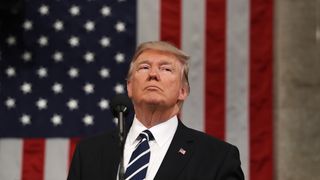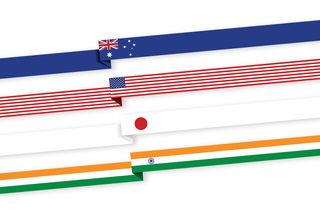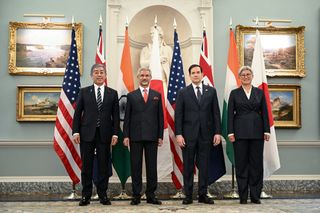In 2015, a very senior Australian government official told me that if Trump was elected president, Australia might need to put its alliance with the US on pause.
At the time of our conversation, Trump was being widely condemned around the world for saying Mexico was "bringing crime, and their rapists" to America.
He was also talking of building "a wall" along the 3145-kilometre Mexico-America border and blithely blaming China for many of America's economic problems.
For many critics, Trump embodied a racist nationalism that was a clear threat to the liberal internationalist values they held dear. Nine years later, Trump is still making similarly racist and xenophobic claims, but most Australian politicians, like most Republicans in the US, have normalised Trump's behaviour by not publicly opposing it.
Kevin Rudd recently suggested fellow ambassadors should "just chill" about the possibility of a re-elected Trump.
The consequences of normalising Trump's behaviour and the willingness to accept a re-elected Trump as Australia's military partner are dangerous and do not seem particularly well thought through by the current Labor government.
The prospect of a second Trump presidency is dangerous because the US-Australia alliance has certainly not been on pause in recent years; in fact, it has been turbo-charged because of the AUKUS announcement of 2021.
Australian domestic military affairs are more entangled with the US today than any time since World War II. If Trump is elected president, he will be at the centre of this intense military engagement with the US.
We must, therefore, consider the question of how the Australian government should prepare for a re-elected Trump. There is a myth that our government dealt effectively with Trump during his first term; rather, like most Republicans in the US Congress, the Morrison government particularly was an enabler of Trump.
The Morrison government avoided condemning Trump when forceful condemnation was required, particularly regarding the events of January 6, 2021. Instead, Australia remained largely silent, as though the peaceful acceptance of clear election results is simply a domestic matter of little concern to Australia.
A second Trump presidency will be a values test for Australia: in other words, the government will be forced to consider what values Australia stands for as a nation and whether, as a good citizen in the international system, it is willing to defend those values by criticising Trump.
AUKUS has been sold to the Australian public by the Morrison and Albanese governments are as an alliance based on values, opposing an unnamed, but obvious, rival that lacks these important values.
Our leaders have told us that the values to which AUKUS is specifically committed to upholding are a belief in international law and the integrity of existing territorial boundaries, as well as more generally the preservation of democracy and other key liberal values.
These commitments are often referred to in Australian foreign policy speeches as a commitment to the liberal rules-based international order. Trump's fealty to liberal values at home and abroad is shockingly non-existent and as a result Australia still should consider putting its alliance with the US on pause if Trump is re-elected president.
Australia should have certain red lines with Trump. Historical closeness to the US should not undermine the government's willingness to criticise him if these red lines are crossed. For some this will be considered too risky, or even extreme, but it is in keeping with one of the most important American political documents, the Federalist Papers. James Madison in the Federalist Papers (# 63) declared that "in doubtful cases, particularly where the national councils may be warped by some strong passion or momentary interest, the presumed or known opinion of the impartial world may be the best guide to be followed."
In other words, at times, good friends need to tell each other hard truths. As a good friend of the US, Australian leaders need to consider this responsibility even knowing they are unlikely to be listened to by Trump (the best hope is that the American people and Trump's advisors at least listen to this disapproval).
The Australian government needs to think through its positioning if Trump is re-elected president and how it might comment on his policy decisions or even openly distance itself from the US if needed.
Some obvious thorny scenarios come to mind: what if Trump wholly abandons support for Ukraine; what if Trump orders or encourages the jailing, deportation, or physical violence against political and legal opponents such as special counsel Jack Smith or Georgia district-attorney Fani Willis; what if Trump engages in the mass internment of thousands of supposedly illegal immigrants to the US; what if Trump orders or encourages physical violence against refugees in America by government forces or by militias; what if Trump uses the US military to carry out violent attacks in Mexico or Central America aimed at killing drug gangs or to impede immigrants making their way to the Mexico-US border; what if Trump gives the Netanyahu government a blank cheque to carry out bombing with no regard for civilian casualties; what if Trump's policies clearly worsen the pace of global warming; what if Trump overturns election results or refuses to leave office in 2029.
These are all deeply disturbing scenarios, but all of these concerns have been widely discussed in various quarters and some of them are likely to occur.
If this seems alarmist, it is useful to recall that, in recent days, Trump's longest-serving chief of staff, General John Kelly said Trump fitted "the general definition of fascist," Trump's chairman of the joint chiefs of staff (America's top military position) has called Trump "fascist to his core," and Trump's defense secretary Mark Esper has said Trump "has those inclinations" towards fascism, going on to say, "I think it's something we should be wary about."
It is prudent for our government to be prepared to counter and contain Trump's excesses. Faced with Trump's bullying, authoritarianism and xenophobia we must be willing to stand up for liberal democratic values. As a nation we diminish ourselves and embolden Trump by staying silent and hoping this is just an American fever dream.









